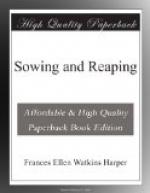she was too sensible to fade away and die the victim
of unrequited love, and in after years when she had
thrown her whole soul into the temperance cause, and
consecrated her life to the work of uplifting fallen
humanity, she learned to be thankful that it was not
her lot to be united to a man who stood as a barrier
across the path of human progress and would have been
a weight to her instead of wings. Released from
his engagement, he entered into an alliance (for that
is the better name for a marriage) which was not a
union of hearts, or intercommunion of kindred souls;
but only an affair of convenience; in a word he married
for money a woman, who was no longer young in years,
nor beautiful in person, nor amiable in temper.
But she was rich, and her money like charity covered
a multitude of faults, and as soon as he saw the golden
bait he caught at it, and they were married, for he
was willing to do almost any thing for money, except
work hard for it. It was a marriage however that
brought no happiness to either party. Mrs. Anderson
was an illy educated, self willed, narrow minded [woman],
full of airs and pretensions, the only daughter of
a man who had laid the foundation of his wealth by
keeping a low groggery, and dying had left her his
only heir. John Anderson was selfish and grasping.
He loved money, and she loved display, and their home
was often the scene of the most pitiful contentions
about money matters. Harsh words and bitter recriminations
were almost common household usages. The children
brought up in this unhealthy atmosphere naturally
took sides with their mother and their home was literally
a house divided against itself. The foolish conduct
of the mother inspired the children with disrespect
for their father, who failed to support the authority
of his wife as the mother and mistress of the home.
As her sons grew older they often sought attractions
in questionable places, away from the sombre influences
of their fireside, and the daughters as soon as they
stood upon the verge of early womanhood learned to
look upon marriage as an escape valve from domestic
discomforts; and in that beautiful home with all its
costly surroundings, and sumptuous furniture, there
was always something wanting, there was always a lack
of tenderness, sympathy and mutual esteem.
“I can’t afford it,” said John Anderson, to his wife who had been asking for money for a trip to a fashionable watering place. “You will have to spend the summer elsewhere.”
“Can’t afford it! What nonsense; is not it as much to your interest as mine to carry the girls around and give them a chance?”
“A chance for what?”
“Why to see something of the world. You don’t know what may happen. That English Earl was very attentive last night to Sophronia at Mrs. Jessap’s ball.”
“An English Count? who is he? and where did he spring from?”
“Why he’s from England, and is said to be the only son and heir of a very rich nobleman.”




